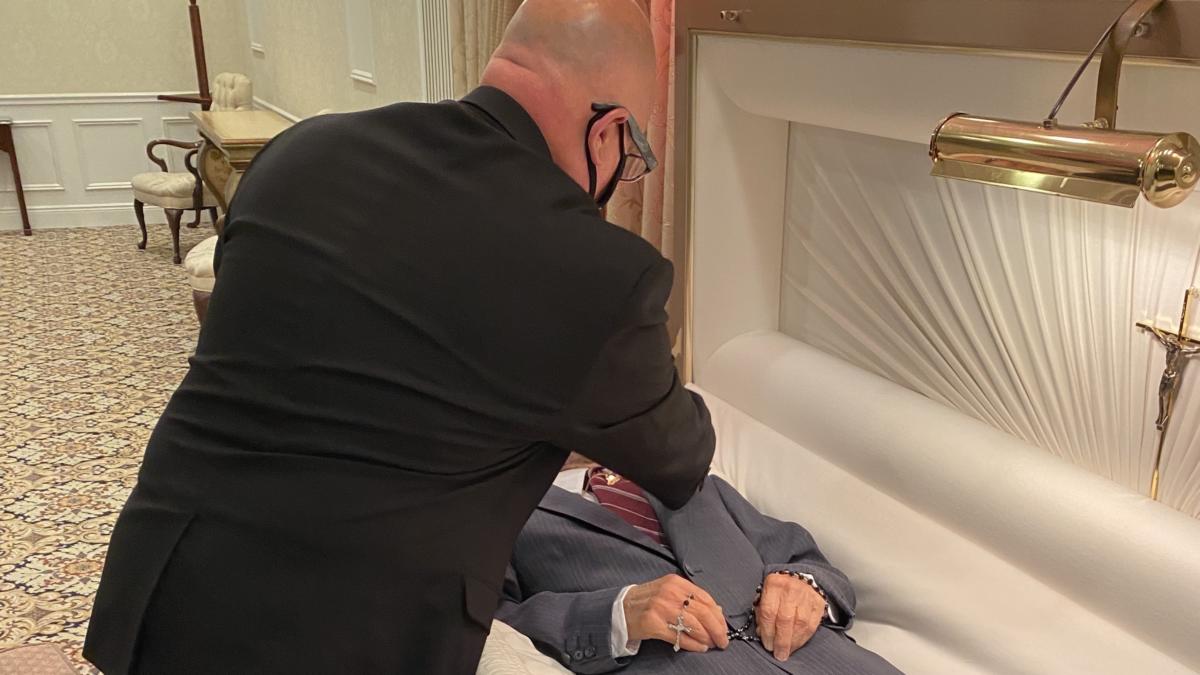During a recent continuing education course, David Peake Jr, a Philadelphia-based funeral director said he learned his profession represented one of the largest groups with undiagnosed Post Traumatic Stress Disorder due to the amount of time they spent around grieving families and death.
Then COVID-19 hit.
“My job at this point is to put on the blinders,” said Peake, president of the Pennsylvania Funeral Directors Association. “Let’s do what we need to do to help these families get where they need to get, and I will deal with whatever I need to deal with whenever I need to deal with it.”
He paused and added:
“The stereotype of the stone-faced, majestic kind of nothing-bothers-us funeral directors is good for Hollywood and good for movies, but again we are all human beings. We have families, so are we fearful of catching or being exposed to COVID-19, yes sure. But as you know, I could also be exposed to it at the grocery store. I am doing everything I can, and I know other funeral directors are doing everything they can, to try to limit the exposure and contracting the disease within the environment which we work with.”
Despite the risks they must take on a daily basis and the strain on their mental health, those who work in funeral homes – many of which are family owned – do not have a union and do not qualify for hazard pay. Yet all the funeral directors interviewed said they remained dedicated to the families they served, despite the pressures of the pandemic.

Over the past several months, everybody that he interacts with in the funeral business, especially in Southeastern Pennsylvania and Philadelphia, had been receiving an increased call volume, said Peake who owns Mannal Funeral Home in Mayfair and Craft Funeral Home of Erdenheim. One crematorium that usually averages about 600 cremations a month had approximately 1,000 cremations in April; that same cemetery, which usually has about 35 burials a month had 70 in April, Peake said, unwilling to disclose which one it was.
As they always have, embalmers continue to use universal precautions, wearing gowns, masks, gloves, and booties – so in that sense, nothing has changed during COVID-19. But almost everything else looks vastly different.
Many funeral directors are meeting virtually with families to make arrangements or doing the arranging entirely over the phone to prevent the spread of coronavirus. There are no flowers, limousines, or hugging people at services.
During the red phase of the pandemic, funeral homes were required to limit the number of individuals attending a ceremony to 10 people or less – with that number having moved up 25 people or less when Philadelphia entered the Yellow Phase on June 12. For those who cannot attend due to volume restrictions, many funeral homes have been live streaming services for extended family and friends to watch remotely.
“Part of the funeral process and part of the grieving process is that we are social beings, and one of the things that helps us with our grieving is seeing those other friends, relatives, and extended family members to share our condolences, to share our stories, to share an embrace,” Peake said. “We can’t do that right now, unfortunately, so what we’re seeing is a lot of family members are experiencing what we’re referring to as delayed grief.”
“That’s the real heartache here, is people passing [away] alone and families aren’t able to be with them holding their hand, talking to them while the inevitable is happening.”
– Mark Rago, president of the Philadelphia Funeral Directors Association
The recognition of someone’s life and someone’s death are critical in the grieving process, Peake said. “And it is very hard for some people if we’re not able to have public memorial services, or public viewings, or masses at this time. So, it’s not as if a family member who lost someone is able to just up and move on with the grieving process, because we can’t really have large funerals right now.”
This has been a particularly difficult time for Robert Weinstein, funeral director at Goldsteins’ Rosenberg’s Raphael-Sacks – with locations in Philadelphia, Bucks County, and South Jersey – because his own father recently died of an illness unrelated to COVID-19. So, while he is trying to help families plan funerals and move into the grieving process, he is grieving right alongside them, Weinstein said.
“I’m going through the same thing that they’re going through, where it’s very difficult, where there’s no real grieving or mourning period,” Weinstein said. “I used to think that it would be okay not having a huge funeral and shiva, – the latter a mourning period in the Jewish tradition – and to have a simple graveside service allowing only 10 people there. But this has been tough for me to deal with right now. I can imagine what everyone else is going through.”
Weinstein added that he and his staff decided not to embalm individuals who died of COVID-19 out of an abundance of caution during the pandemic.
“If they [public health officials] could give us 100 percent certainty that we should be embalming, then we would,” Weinstein said. “But nobody really can do that as of right now, so we, as a firm, chose not to perform embalming.”

Instead, they store COVID-19 corpses in their large refrigerated facility until the funerals are scheduled, and they continue to embalm people who have died from other causes. But Weinstein’s son still goes out 24-7 to pick up bodies and bring them to their facilities. They have been experiencing more calls than they ever have before, Weinstein said.
Robert Burns, whose firm has two locations in Philadelphia and one in Bucks County, said that they have still been meeting with people in their homes to make funeral arrangements if that is what the families prefer. But they have also been doing more arrangements over the phone than pre-pandemic, Burns said.
“We figure they’re calling us and it’s already a bad time,” Burns said. “And then it’s even worse because some people want to have traditional funerals with everybody in the room and a lunch and afterwards, and we’re not able to do that. So, we just want to accommodate people to the best of our ability.”
His numbers have been dramatically up, Burns said. The firm usually averages one funeral a day, and during the red phase, it was having at least two a day with intensive cleaning in between.
But lately, the volume is starting to slow down and normalize, Burns said.
“If they [public health officials] could give us 100 percent certainty that we should be embalming, then we would,” Weinstein said. “But nobody really can do that as of right now, so we, as a firm, chose not to perform embalming.”
– Robert Weinstein, funeral director at Goldsteins’ Rosenberg’s Raphael-Sacks
Mark Rago, president of the Philadelphia Funeral Directors Association, whose Monti-Rago Funeral Home is on South Broad Street, also said that his numbers have declined from the dramatic increase they were seeing earlier in the pandemic. Where in an average week in April they may have had four to six funerals, his funeral home was having at least eight or nine funerals a week, Rago said.
What he’s learned from that early surge is that the crematoriums were getting overwhelmed, so it was important to have enough refrigeration capacity to store bodies, Rago said. It could be important again as doctors, like chief epidemiologist Anthony Fauci, warns of a possible spike in the number of U.S. cases over the next few months.
He, like other funeral directors, said that one of the worst parts about the pandemic is families not being able to be together during the time of death from COVID-19.
“That’s the real heartache here, is people passing [away] alone and families aren’t able to be with them holding their hand, talking to them while the inevitable is happening,” Rago said.
Peake agreed, adding, “We, as funeral directors, signed up for this. I have three children from two to eight. They didn’t. So, I’m trying not to bring anything home to them.”

This story is a part of Philadelphia Weekly’s Behind the Frontlines series, which examines the lives of other essential workers otherwise forgotten in the midst of the COVID-19 pandemic. Behind the Frontlines is delivered in partnership with WHYY and Broke in Philly, a collaborative reporting project among 23 news organizations, focused on Philadelphia’s push towards economic justice. Read more of our reporting at brokeinphilly.org.





